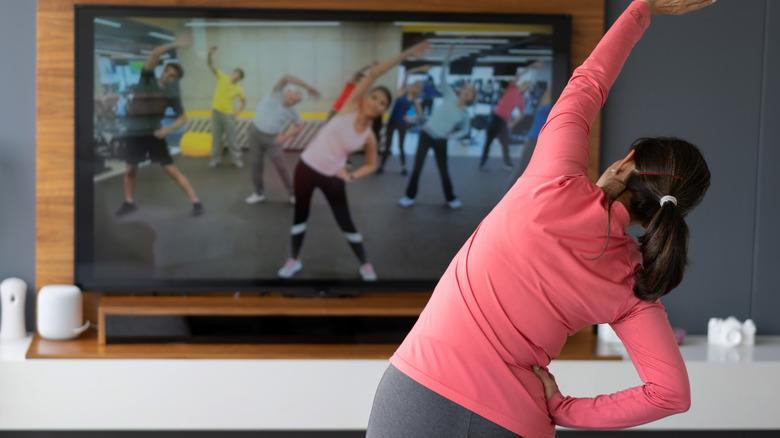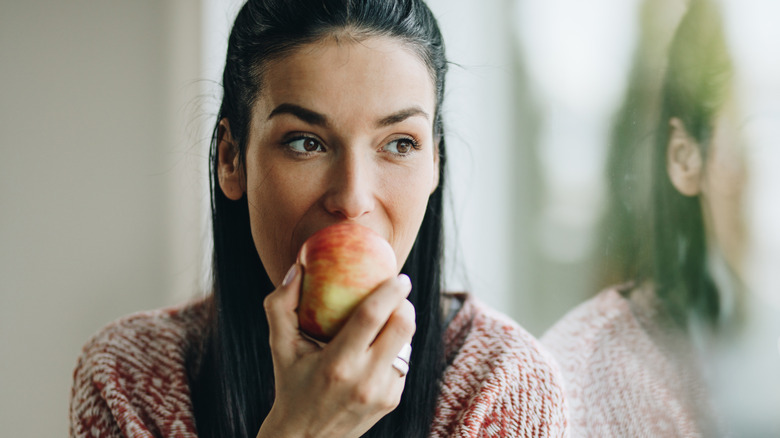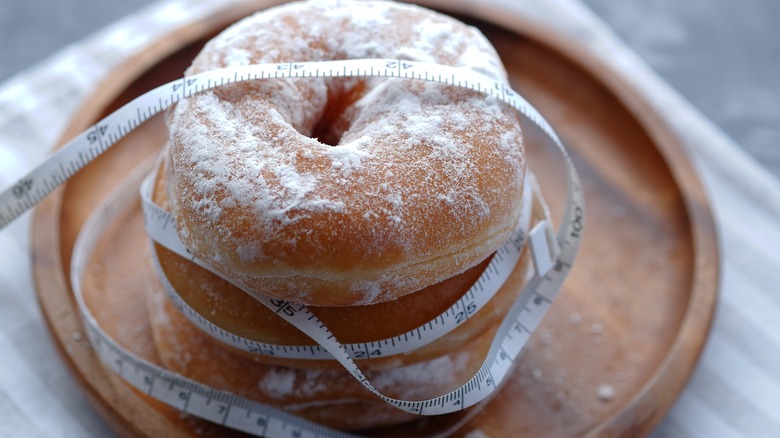This Could Be Why You're Not Losing Weight (Even If You're Exercising And Dieting)
Losing weight can sometimes feel like an uphill battle. Your motivation to lose weight or get healthy might be high at certain times of the year, such as New Year's or a few months before a class reunion. A fad diet might shed several pounds quickly, but you know of many people who've gained that weight back. So you decide to embark on a longer journey of weight loss by including a good balance of diet and exercise because this time, you'd like to keep the weight off for good.
Yet when you step on the scale each week, you don't see the results you were hoping for. Sure, you might have lost a few pounds in the first few weeks, but now your motivation is waning. There might be several reasons you're not losing weight in spite of your diet and exercise plan. Just a few tweaks to your current regimen might have your metabolism and weight loss humming again.
You might not be eating enough food
It might be tempting to start a diet plan by severely cutting calories. If you're also exercising, you might not be eating enough to sustain your daily activities. When your body notices a significant slowdown in your food intake, it thinks that you might be in a famine. Your body responds by slowing your metabolism, meaning that you need fewer calories to sustain your everyday body functions like digestion and pumping blood (via NBC News).
What's also tricky if your weight loss is stalling is that less fat means less leptin in your system. Leptin is stored in your fat cells and tells you when you're full, according to Cleveland Clinic. When you begin to lose fat, your body has less leptin and begins to believe you're going to starve. Your body then responds by kicking in your hunger signals so it can regulate your body weight. What's more, seriously restricting your calories for a few days might set you up on a diet/binge cycle. This might have you going overboard on your binge days by eating way more calories than your body needs.
You're forbidding foods
Many fad diets work in the short term because they cut out certain foods like carbs or fat. Yet, let's face it, you might really crave some of the "bad" foods on those lists. And some of the "good" foods on these diets might not necessarily be healthy in excess. Rather than cutting out some of your favorite foods, allow yourself a small portion of them while you're dieting. That way, you're looking at a more long-term approach to weight loss.
Diets that limit carbs while you're exercising might rob your body of important nutrients for weight loss. Nutritionists tell NBC News that you should aim for a diet with 50% of your calories from carbohydrates such as vegetables and whole grains, 30% protein from lean meats, and 20% fat from nuts and avocado.
You might also find that increasing your protein intake to 30% of your daily calories can help reduce your appetite (via Healthline). Protein also burns more calories while you digest it (called the thermic effect of food), and it will also stoke a slowing metabolism.
You're not tracking hidden calories
If you're dieting, you could easily feel left out of social gatherings such as happy hours and restaurant openings. Yet a little drink here or there can wreck your weight loss, according to Better Health Channel. Not only does alcohol put a halt to your fat burning, but it will have you reaching for less healthy options after it drains your willpower. Alcohol can sneak a few hundred calories into your daily energy intake, especially those delicious ones that are like dessert. A pina colada has 526 calories, while a white Russian has 568 calories.
Eating while distracted might also have you reaching for more calories than you're aware of. A 2022 article in Appetite found that eating while engaged in other behaviors, such as watching television or working, can result in a higher body mass index. It's easy these days to count your calories or macronutrients using apps on your phone. It also might make you somewhat obsessive about every calorie, which could awaken eating disorders. A better approach might be to track a certain nutrient each day, such as fiber or protein (via Healthline).
You're eating processed food
Food manufacturers offer many types of convenience foods that aren't great for weight loss. There are also plenty of "health foods" on the market, but many of them are overly processed and not healthy (via Healthline). According to the National Institutes of Health, hydrogenated oils, high-fructose corn syrup, flavoring agents, and emulsifiers found in ultra-processed foods can cause you to consume more calories than if you focused on whole foods.
If your diet is heavy in processed foods, you're also disrupting your gut microbiota, according to a 2019 article in Nutrients. A 2020 article in Preventive Nutrition and Food Science found that the diversity of bacteria in your gut can also influence your metabolism. When you add probiotics, prebiotics (such as fiber from fruit and vegetables), and synbiotics to your diet, you're helping your body avoid the mechanisms that lead to weight gain. Eating foods that are close to their natural state can also help you feel full.
You use exercise to allow you indulge
The National Weight Control Registry says that 90% of people who have lost weight and kept it off have exercised for at least an hour a day. However, avoid seeing exercise as a means to treat yourself to something unhealthy. Exercise is only 30% of the weight loss equation compared to diet's 70% (via NBC News).
According to Medical News Today, you need a certain number of calories a day depending on your basal metabolic rate, which is based on your sex, height, weight, and age. Adding a little exercise a few days a week increases your daily calorie needs, but it also considers how active you are throughout the day. Even if you exercise before or after work, sitting at your desk all day without getting up for a stretch can also stall your weight loss. According to Beaumont Hospital, your body produces less lipase when you sit for too long. Lipase helps your body break down and use fat. If your body isn't using the fat, it will show up as fat on your body.






